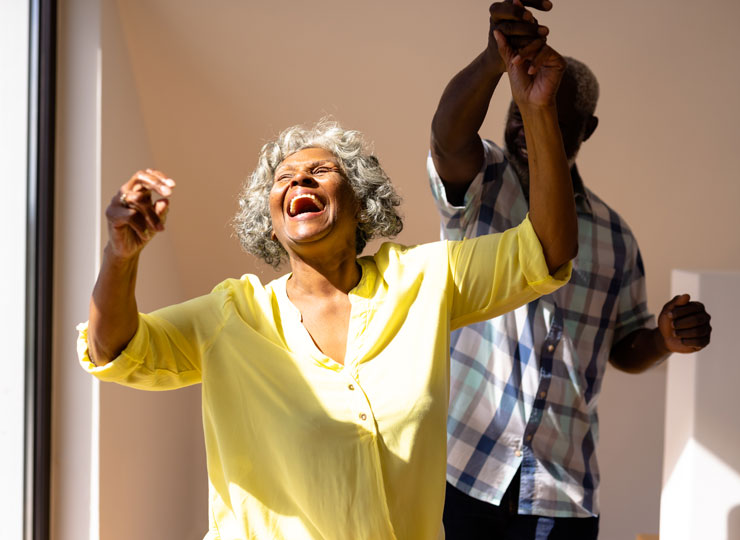
October 19, 2022
Need an easy, drug-free way to help make caring for a loved one with Alzheimer’s a little easier? Try adding a little Frank Sinatra or Julie Andrews to the mix.
A small new study found that people with Alzheimer’s disease who listened to or sang along with songs from their youth along with caregivers became less agitated, anxious and depressed. Many of the patients had somewhat advanced disease and limited abilities to communicate with others, but participating in a music program strengthened emotional bonds and connections between patients and family members.
The study adds to growing evidence suggesting that music may have benefits for people with Alzheimer’s disease or other serious memory problems. Earlier studies have shown that actively participating in music programs can lead to a small but significant boost in memory and thinking skills, and musical participation also showed promise in improving emotional well-being and quality of life for people with dementia.
The current study, from Northwestern Medicine in conjunction with the Institute for Therapy through the Arts (ITA), differed from earlier studies in that it involved both people with Alzheimer’s and those who cared for them. Benefits were noted both for patients and caregivers.
“Patients were able to connect with partners through music, a connection that was not available to them verbally,” said Dr. Borna Bonakdarpour, the lead author and an associate professor of neurology at Northwestern University Feinberg School of Medicine. “The family and friends of people with dementia also are affected by it. It’s painful for them when they can’t connect with a loved one. When language is no longer possible, music gives them a bridge to each other.”
For the study, researchers enlisted 21 people with Alzheimer’s or other forms of dementia who were living at Silverado Memory Care, a residential facility outside Chicago. Family members who had long helped care for them were also part of the study.
Via a music program called “Musical Bridges to Memory” that was developed by ITA, the teams listened to live performers sing and play music from their youth. Songs included old standards like “You Are My Sunshine,” “Take Me Out to the Ballgame,” and “You’re a Grand Old Flag,” as well as those from musicals like “Oklahoma” and “The Sound of Music.” The musicians also took requests. Patients and caregivers joined in, singing, dancing and playing simple instruments like drums or tambourines, encouraged by music therapists who were part of the program.
Patients and caregivers met with the musicians for about an hour weekly over three months. Compared to a similar group that got standard care, those with dementia who were part of the music program showed lower levels of anxiety and depression. Those who had participated in the music program were also more socially engaged, showing more eye contact with others, better focus and less agitation.
Before the music program, some of the men and women with Alzheimer’s had little or no communication with their family members. But during the music intervention, they started to play, sing and dance together. Interactions between family members improved outside the music sessions as well.
“As the program progressed, caregivers invited multiple family members,” said Jeffrey Wolfe, a neurologic music therapist-fellow at ITA and leader of the Musical Bridges to Memory program. “It became a normalizing experience for the whole family. All could relate to their loved one despite their degree of dementia.”
Dr. Bonakdarpour noted that as Alzheimer’s disease advances, music memories from the past often remain accessible in the brain, even as language falters and more recent memories fade. Patients often retain the ability to dance and sing long after their ability to express themselves with words.
Caring for a loved one with advancing Alzheimer’s can become especially frustrating as communication becomes more difficult and patients become increasingly agitated or depression. Music may provide a calming effect and help to foster communication and strengthen bonds.
While this study used live musicians and trained music therapists, other studies suggest that actively engaging in song and dance may have benefits for those with Alzheimer’s disease. So why not give it a try at home?
Pick songs or music that is familiar and enjoyable for the person with Alzheimer’s disease. Playing favorite music or songs from their childhood or young adult years may be particularly soothing. Encourage those with Alzheimer’s to clap or sing along or play a musical instrument. Supplement music with fond reminiscences and family photos.
Many senior care centers and Alzheimer’s support groups hold music and sing-along sessions in communities nationwide. And for those that don’t, integrating a music program into a community center, nursing home or your own home may be an invaluable addition to caring for anyone with Alzheimer’s disease.
By ALZinfo.org, The Alzheimer’s Information Site. Reviewed by Marc Flajolet, Ph.D., Fisher Center for Alzheimer’s Research Foundation at The Rockefeller University.
Source: Rhiana Schafer, Aimee Karstens, Emma Hospelhorn, et al: “Musical Bridges to Memory: A Pilot Dyadic Music Intervention to Improve Social Engagement in Dementia.” Alzheimer’s Disease and Associated Disorders, published online August 25, 2022











